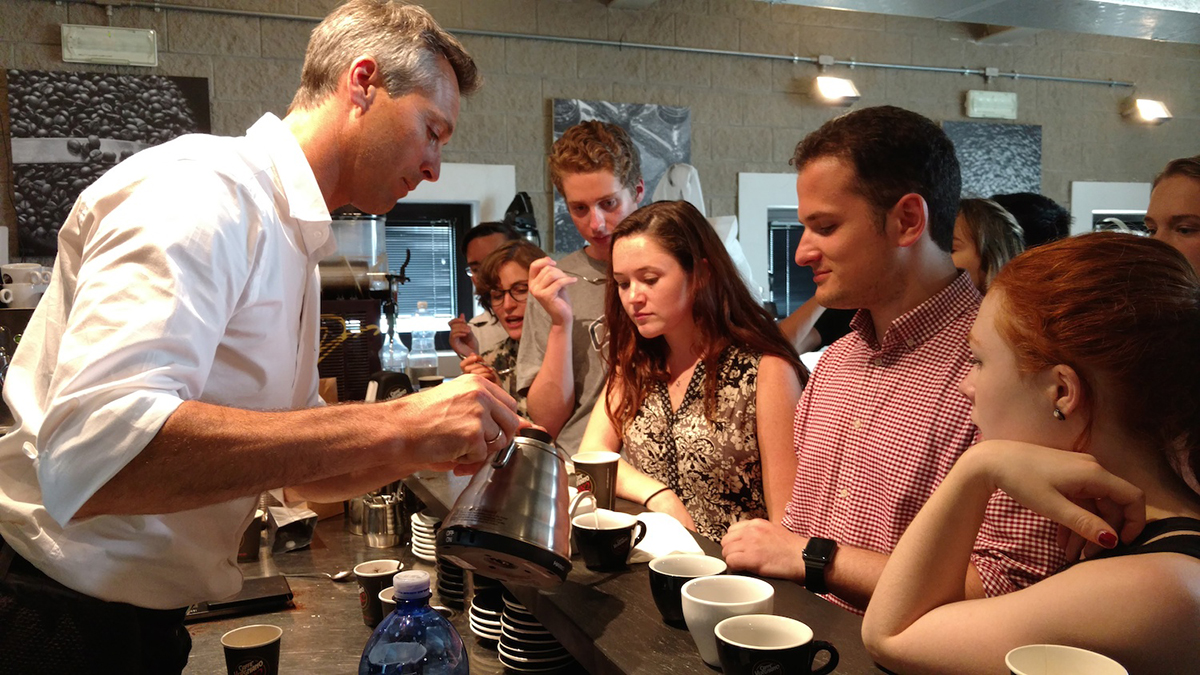Cornell in Turin students get good view of Euro unrest
By Tyler Alicea

As Great Britain voted to exit the European Union and the continent’s ongoing migrant crisis continued, Cornell in Turin summer program students examined these hot-button issues in real time through a course offered by the Department of Policy Analysis and Management (PAM).
The three-week class, Population Controversies in Europe and the U.S., taught by College of Human Ecology professors Sharon Sassler, Matthew Hall and Daniel Lichter, allowed students to examine population changes and their consequences for various cultural, political and economic structures while living and studying in Turin, a city of approximately 2 million residents in northern Italy.
Students met for formal lectures and class discussion, as well as community excursions to a Milan-based organization for resettling refugees, a conversation with young Italians about their views on employment opportunities and their family expectations, and a trip to an after-school program supporting immigrant children adapting to their new country. Hall said the class combines knowledge on migration, family demography, politics and current events with students’ experiences studying abroad.
“For the few weeks that they are there, they are immigrants in a broad definition of the word,” Hall said, adding that living in another country helps students to better grasp how immigrants might be more effectively integrated into society.
Sassler said the course also explored how facets of young adulthood – such as living at home with parents and the timing of marriage and family planning – varied across the U.S. and Europe. “Our goal is to encourage students to consider how their lives might differ if they were living in Italy or Spain or Germany compared to the United States,” Sassler said.
Although the class focused broadly on Europe, Italy offered a laboratory to study such themes as immigration and ethnic change, family dynamics and transitions, and poverty and inequality. Course readings allowed students to explore how migration, family formation processes and social welfare policies differed across Europe, and students chose a country to study throughout the course, comparing that nation’s population dynamics with changes and controversies occurring in Italy.
The course also allowed students to experience parts of Italy they would not otherwise see as tourists, according to Hailey Brace ’19, a PAM student. For example, she said meeting with immigrants and refugees allowed her to consider face to face the human side of immigration.
PAM student Stephanie Chi ’18 was drawn to the course to study “Europe in Europe itself,” noting that it allowed her to examine perspectives more deeply, even if some Italian cultural customs were new to her. “Nevertheless, we should not be xenophobic and fear these differences, but rather we should embrace and celebrate such cultural differences,” she said.
Now in its third year, the course is offered to undergraduates across Cornell, in addition to a small number of students from Mississippi State University through a partnership with Cornell. “Students are exposed to diverse perspectives in terms of the content of the class but also in terms of the experiences and backgrounds of their peers,” Hall said.
The Cornell Institute for European Studies operates the Cornell in Turin program, providing students with opportunities to study European politics and related issues. Another course, European Politics, offered through Cornell’s Department of Government, preceded the class on population dynamics. Next summer, the Cornell in Turin program will likely offer three- or six-week-long internships to expand the program’s engagement with the community.
Tyler Alicea ‘16, MPS ’17 is a student writer for the College of Human Ecology.
Media Contact
Get Cornell news delivered right to your inbox.
Subscribe